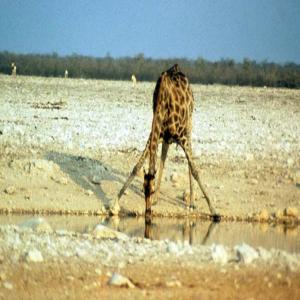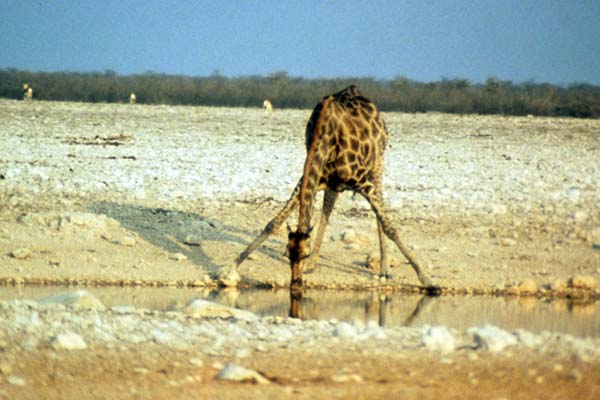Episodes

Monday Aug 15, 2011
The WildLife: Commercial Porcupine Farming in Vietnam, Emma Brooks
Monday Aug 15, 2011
Monday Aug 15, 2011
IUCN program officer Emma Brooks discusses illegal wildlife trade in Vietnam and her research on how commercial farming of a traded species, like porcupines, affects both the species and the trade. She tells “The WildLife” host Laurel Neme how most animals in Vietnam’s wildlife trade end up on the plates of wealthy restaurant patrons. In Vietnam and elsewhere, commercial wildlife farming, meaning the breeding of wild species for legal sale, is often promoted to supply demand while preventing overhunting in the wild. However, in a study on the conservation impact of commercial wildlife farming of porcupines in Vietnam published in August 2010 in Biological Conservation, IUCN program officer Emma Brooks concluded that commercial porcupine farming is instead having the opposite effect.
Emma Brooks has been involved with numerous conservation projects around the world, from biodiversity surveys in Mozambique to Giant River Otter counts in Bolivia. She first became interested in wildlife trade issues during her MSc at the University of East Anglia, UK. Her research in the trade in porcupines formed her dissertation topic, for which she spent three months collecting data and interviewing locals in northern Viet Nam. Emma now works for the IUCN, as part of the Global Species Programme based in Cambridge, UK. Her work includes assessing the extinction risk of species from around the world for inclusion on the IUCN Red List of Threatened Species, as well as using the information gathered to analyze species richness, major species and habitat threats, and important areas for biodiversity. The importance of species, ecosystems and services to human livelihoods and wellbeing is increasingly being recognized, and she works in a number of areas to provide the information to support decisions for the protection of species and livelihoods. This episode of “The WildLife” was posted on August 15, 2011.
The WildLife is a show that explores the mysteries of the animal world through interviews with scientists, authors and other wildlife investigators. It airs every Monday from 1-2 pm EST on The Radiator, WOMM-LP, 105.9 FM in Burlington, Vermont.
Monday Jun 20, 2011
The WildLife: Bear Bile Trade in Asia, Kaitlyn Foley
Monday Jun 20, 2011
Monday Jun 20, 2011
Kaitlyn Foley, senior programme officer at TRAFFIC Southeast Asia, talks about the bear bile trade in Asia. She tells “The WildLife” host Laurel Neme how recent research by TRAFFIC shows that the illegal bear bile trade continues unabated across Asia on a large scale.
The poaching and illegal trade of bears is driven largely by the demand for their bile, which is used in traditional medicine and folk remedies. Research by TRAFFIC, published in the report Pills, Powders, Vials & Flakes: The bear bile trade in Asia, found bear bile products on sale in traditional medicine outlets in all but one (Macao) of the 13 countries/territories surveyed, suggesting a complex and robust trade in bear products. Of particular note were mainland China, Hong Kong, Malaysia, Myanmar and Viet Nam, where bear bile products were most frequently observed. While bile from bear farms in China is legal if sold domestically, TRAFFIC found this Chinese bear bile being illegal sold across the border. It also noted that “Mom & Pop” bear farms were popping up in Laos and Myanmar, making these countries new potential hubs for this trade.
Kaitlyn-Elizabeth Foley is a senior programme officer at TRAFFIC Southeast Asia. She holds a BA in Anthropology from the University of Rhode Island and a Master of Science in Primate Conservation from Oxford Brookes University. Her main research interests include wildlife trade, conservation, and animal behavior and welfare. For the past nine years, Kaitlyn has lived and worked abroad in Italy, the United Kingdom and Malaysia. Most recently her work and research interest has been focused on the conservation and mitigation of trade in bears and the pet trade of mammals in Asia. This episode of “The WildLife” aired on The Radiator, WOMM-LP, 105.9 FM in Burlington, Vermont on June 20, 2011.

Monday Dec 27, 2010
The WildLife: Reindeer, Nancy Bazilchuk
Monday Dec 27, 2010
Monday Dec 27, 2010
Nancy Bazilchuk reveals reindeers’ special adaptations as she describes her dramatic cross country ski trek across Hardangervidda Plateau in one of Norway’s most famous national parks in search of this elusive animal. Traveling the same route that nearly defeated legendary explorer Roald Amundsen, she tells “The WildLife” host Laurel Neme about the slow seasonal waltz from east to west as the wild reindeer let winter storms expose the lichens they depend on for 80 percent of their winter diet and also divulges whether reindeer really can fly. Nancy Bazilchuk is a freelance science writer and editor living in Norway. She used to work the environmental beat at Vermont’s Burlington Free Press, where she covered a range of topics such as land use controversies, invasive species and hazardous waste sites. She’s written for numerous publications, including the New Scientist, Scientific American and Audubon Magazine. This episode of “The WildLife” originally aired on The Radiator, WOMM-LP, 105.9 FM in Burlington, Vermont on December 28, 2009 and was rebroadcast December 27, 2010.

Monday Nov 15, 2010
The WildLife: Wildlife Filmmaking, Chris Palmer
Monday Nov 15, 2010
Monday Nov 15, 2010
Chris Palmer, veteran filmmaker and author of Shooting in the Wild: An Insider’s Account of Making Movies in the Animal Kingdom (Sierra Club Books, 2010), exposes the dark side of wildlife filmmaking. He tells “The WildLife” host Laurel Neme about his experiences in wildlife filmmaking, its conservation impact, and how audiences are deceived as filmmakers take shortcuts to get their “money shot.” Did you know the famous shots of lemmings hurling themselves over a cliff in the 1958 Disney documentary "White Wilderness" was faked, and that the film crew actually threw the animals to their doom? Chris Palmer reveals the motivations for this type of trickery and why these deceptions can be both helpful and problematic. He’ll also discuss the implications of intrusive, on-camera hosts like Jeff Corwin, Steve Irwin and Bear Grylls, and what the sensationalized “fangs and claws” type shows, like Man vs. Wild, mean for wildlife conservation.
Chris Palmer has produced more than 300 hours of original programming for prime-time television and theatrical release over the past 25 years. His films have been broadcast on the Disney Channel, TBS Superstation, Animal Planet and PBS, as well as in IMAX theaters. He has many awards, including two Emmys and an Oscar Nomination. In 2004, he founded the Center for Environmental Filmmaking at American University’s School of Communication, which he now directs. Profiles about Chris and his book have appeared in many different media outlets, including National Public Radio (NPR), the Wall Street Journal and The Washington Post, as well as on Nightline, Good Morning America, the Today Show, the Fox News Channel, and other networks. This episode of “The WildLife” aired on The Radiator, WOMM-LP, 105.9 FM in Burlington, Vermont on November 15, 2010.

Monday May 24, 2010
The WildLife: Moon Bear Farming & Rescue, Jill Robinson
Monday May 24, 2010
Monday May 24, 2010
Jill Robinson, founder of Animals Asia Foundation, talks about Asiatic black bears, also known as moon bears, and discusses the practice of farming them for their bile in China, Vietnam and elsewhere. She tells “The WildLife” host Laurel Neme about the horrific conditions on many of these bear farms and what she and others are doing to save them. In one of the most poignant moments of the interview, Robinson reveals the amazing capacity of these bears to forgive, noting “you’d have to be someone like Mandela to be able to forgive that sort of imprisonment” and also that the bears rescue people as much as people rescue the bears, saying “These bears teach us to be better people. They teach us to forgive. They teach us to overcome our problems and difficulties.” Born in the United Kingdom, Jill Robinson arrived in Hong Kong in 1985 and spent the next 12 years working in Asia as a consultant for the International Fund for Animal Welfare. In 1993, a chance visit to a bear farm in southern China changed Jill's life. Starting with this visit, she’s worked tirelessly to expose the plight of endangered Asiatic black bears cruelly farmed and milked for their bile, and learned how easily herbs and synthetics could replace bear bile. In 1995, she secured the release of the original bears she had discovered in 1993. Then, in 1998, she founded Animals Asia and in July 2000 she and the Animals Asia team signed a breakthrough agreement with the Chinese authorities to rescue 500 farmed bears and work towards promoting herbal alternatives to bile and the elimination of bear farming. Today, the Moon Bear Rescue has seen the rescue of 260 bears in China and the opening of a new rescue centre for 200 farmed bears in Vietnam. To date, 30 bears have been rescued there. Animals Asia’s Moon Bear Rescue sanctuaries are spearheading far-reaching community, education and welfare programs, which benefit both animals and people alike. Jill is a former member of the Hong Kong Government’s Animal Welfare Advisory Group and has received numerous awards in recognition of her services to animal welfare in Asia, including the Readers Digest “Hero for Today” award, an MBE by Queen Elizabeth in the Birthday Honours List, the USA Genesis Award (which is the only major media and arts award concerning animal issues), and others. In 2008, she was named “Outstanding Earth Champion” in Hong Kong and was appointed World Animal Day Ambassador for Asia. This episode of “The WildLife” aired on The Radiator, WOMM-LP, 105.9 FM in Burlington, Vermont on May 24, 2010.

Monday Mar 15, 2010
The WildLife: Tiger trade & farming, Grace Ge Gabriel
Monday Mar 15, 2010
Monday Mar 15, 2010
Grace Ge Gabriel, Asia Regional Director for the International Fund For Animal Welfare (IFAW), discusses tiger farming and the international tiger trade. She reveals to “The WildLife” host Laurel Neme how the international trade in tiger parts works and why it has spawned a booming industry of tiger farming in China that is truly killing to make a living. After joining the International Fund for Animal Welfare in 1997, Grace Ge Gabriel established the IFAW China office where she managed and directed an array of wildlife conservation campaigns and projects in China and Asia. For over a decade, she’s been actively involved in the global campaign to end the tiger trade and has personally investigated the illegal trade in tiger parts and derivatives. She’s also spearheaded numerous campaigns, including those to protect Tibetan antelope, reduce trade of wildlife and products including bears, tigers, elephants, and others that improved the status of companion animals through legislation and education. She’s also been involved in projects to conserve Asian elephant habitat, provide emergency relief to animals in disasters and establish China’s first raptor rescue center. She was born and grew up in China. She received her degrees in journalism and communications both in China and the United States. She is fluent in both Mandarin Chinese and English. This episode of “The WildLife” aired on The Radiator, WOMM-LP, 105.9 FM in Burlington, Vermont on March 15, 2010. Article and transcript available on Mongabay.com.

